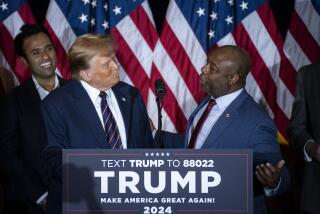Rand Paul invokes 19th century abolitionist movement in first Senate speech
- Share via
WASHINGTON -- Comparing the crusade to slash federal spending with the ideals of the 19th century abolitionist movement, “tea-party” standard bearer Rand Paul delivered his maiden speech on the floor of the Senate on Wednesday.
Paul, a freshman senator from Kentucky, outlined his approach to working with his fellow Republicans and the opposition Democrats in the chamber, saying that the debate over spending must concern how the federal budget should be reduced, rather than whether it should be reduced.
“The compromise must be conservatives acknowledging that we can cut military spending and liberals acknowledging that we can cut domestic spending,” he said. He also urged Congress to tackle entitlement reform, without specifying how he would adjust Medicare and Social Security.
“There is a certain inevitability to this debate as the debt bomb looms and grows perilously large,” Paul said.
Paul, the son of Rep. Ron Paul of Texas, spent much of his brief floor speech, a Senate tradition, discussing the legacy of his famous predecessor, Henry Clay, who served in both the House and the Senate during his nearly 50-year political career. Noting that Clay was known as the Great Compromiser, Paul suggested compromise came at a cost.
“Is compromise the noble position?” he asked, adding that Clay’s desire to preserve the unity of the fragile nation in the first half of the 19th century ultimately kept the slave trade alive. His work “ultimately may have invited the war that came,” Paul said.
Paul pointed to anti-slavery advocates William Lloyd Garrison, Frederick Douglass, and Clay’s cousin, Cassius Clay of Kentucky, as political role models, arguing that they refused to compromise their ideals.
“Cassius Clay was a hero, but he was permanently estranged from Henry Clay,” Paul said. “Henry Clay made no room for the true believers, for the abolitionists. Who are our heroes?”
Although making clear that “today we have no issues that approach the moral equivalency with the issue of slavery,” Paul’s invocation of the 19th century abolitionist movement was notable.
After Paul last year declared his candidacy for Senate, his criticism of the Civil Rights Act of 1964 sparked a brief media brush fire. Paul suggested he opposed the provision of the act that prohibited discrimination by private businesses, contending that it was an abuse of federal power. Paul later said he would have voted for the entire civil-rights bill and would have marched with Martin Luther King Jr. to end institutional racism.
Only two senators watched Paul’s remarks from the chamber, fellow Kentuckian Mitch McConnell and Jim DeMint of South Carolina.
joliphant@latimes.com twitter: @jamesoliphant
Lisa Mascaro of the Washington Bureau contributed to this report.More to Read
Get the L.A. Times Politics newsletter
Deeply reported insights into legislation, politics and policy from Sacramento, Washington and beyond. In your inbox twice per week.
You may occasionally receive promotional content from the Los Angeles Times.










